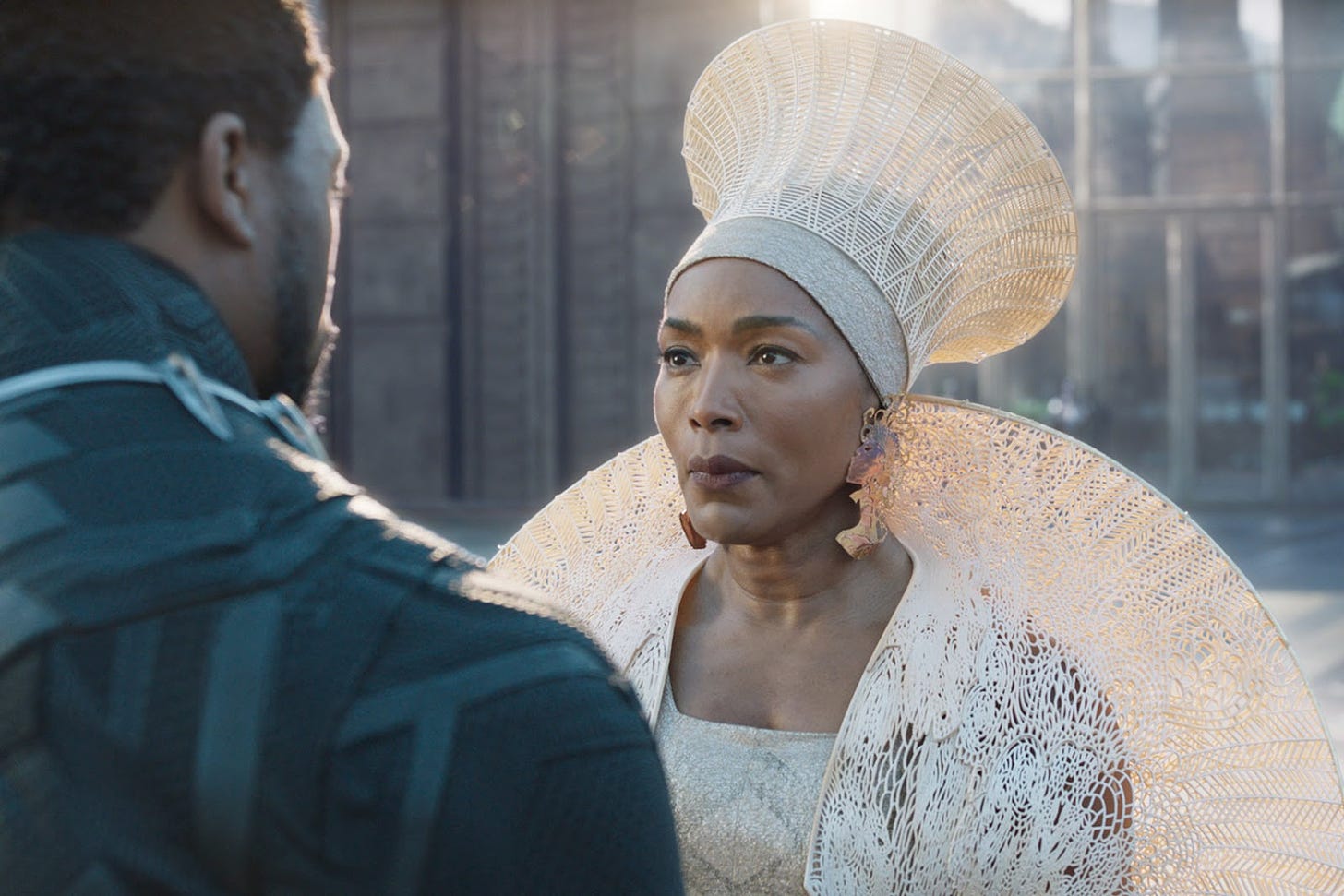What Angela Bassett's "Queen Ramonda" Soliloquy in the Wakanda Forever Trailer Can Teach Us About the Trauma 'Strong' Black Women Carry

I am Queen of the most powerful nation in the world and my entire family is gone. Have I not given everything?! ~ Angela Bassett as Queen Mother Ramonda in Wakanda Forever
Marvel Studios dropped the trailer for the highly anticipated Wakanda Forever, the follow-up to the 2018 cinematic mega-blockbuster that was Black Panther, and everything from the stunning visuals to the adapted version of Bob Marley’s “No Woman, No Cry” blending into Kendrick Lamar’s “Alright” made for one of the most captivating movie trailers to come along in recent history. Across social media, both diehard and casual fans of the Black Panther franchise confessed to either barely fighting back tears or admitted to tears falling during the two-minute preview, as everyone who watched the trailer knew that there would be an enormous vacancy in the casting.
To say that it is impossible to separate the spirit of Chadwick Boseman from the Black Panther franchise is quite the understatement. In the two years since Chadwick’s surprising and untimely death from colon cancer, fans and as well as his Black Panther co-stars, have at times struggled to process the loss of one of the most talented and principled actors Hollywood had seen in decades. Chadwick was loved as Jackie Robinson in 42, celebrated as James Brown in Get On Up, and respected as Thurgood Marshall in Marshall, but was absolutely transcendent as King T’Challa in Black Panther. His characterization as the noble king of the fictional African country of Wakanda gave an upcoming generation of Black children a symbol of superheroism and regality and played an undeniable role in Black Panther grossing $1.34 billion worldwide in box office ticket sales — an unprecedented accomplishment for a superhero movie comprised of a majority Black cast.
In Black Panther, Black moviegoers saw the concept of a utopian nation led by a warrior-king that revered the wisdom of his mother, relied on the tech-savvy brilliance of his kid sister, sought to uphold the kingship of his late father, trusted the military counsel of his nation’s all-woman special forces unit and led with grace and ancestral guidance. Chadwick Boseman’s personhood off-camera made his personification of T’Challa that much more believable. He moved with grace and purpose and in service to his craft and his community — it is what made his death amid a season rife with death that much more difficult to bear. It is what made Angela Bassett’s soliloquy in the trailer for Wakanda Forever that much more of a heart-wrenching example of art imitating life.
And as I like many others watched the trailer for Wakanda Forever multiple times, I could not help but be moved by Queen Mother Ramonda’s words as they were symbolic of the pain and resilience and questioning and tension experienced by generations of Black matriarchs who had loved ones perish in either the “opening credits” or “intermission” of their lives. The Black mothers and grandmothers and daughters and sisters and wives who kept showing up to the set of a never-ending reality in the face of unfathomable grief. The Black women who gave so much of themselves to their families only to lose branches from their family tree to a country…culture…world that fertilized its hatred for Black bodies with the blood of their relatives.
Though Chadwick did not die violently in real life, his character’s death and his movie mother’s emotional plea to the universe likely struck a cultural nerve with anyone who’s ever wept along with a Black matriarch they never met who lost a loved one to violence, specifically. Over the past decade and a half so many of us have had front-row seats to the grief and agony of Black women on display in high definition. We have marveled at their ability to keep it together as the world was folding in on them, and had ended for family members they cherished. We have reveled in their queendom for not falling apart when the Grim Reaper invaded their castles, and have comforted ourselves with the idea that they would be alright because we saw strength when the cameras were on.
We have not been privy to the director’s cut of their grief when the lights were off, and they had nothing but their sadness to stew in.
Keep reading with a 7-day free trial
Subscribe to Observations In Blackness by Donney Rose to keep reading this post and get 7 days of free access to the full post archives.


